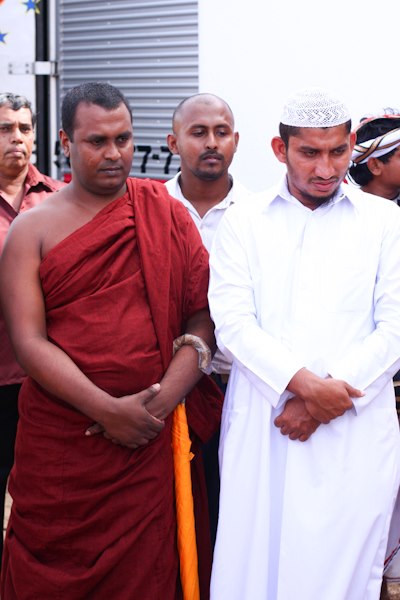
If you spend any time at all in Sri Lanka you quickly learn that it is a land of diversity and contrasts. There are Sinhalese Buddhists, Tamil Hindus, and Muslims who speak Tamil but aren’t ethnically Tamil just to keep things interesting. Buddhism is by far the dominant religion, of course, and the Buddhist priests (as the leaders of the majority religion) have great respect and political power in the communities. Organizations that openly proselytize may soon find themselves effectively shut out of a community or even asked to leave. So if the great commission to Christians is to preach the gospel then how does a person live authentically as a Christian in a place where explicit gospel presentations are not allowed? How do you sing the Lord’s song in a strange land?
When World Vision goes into an area they make no secret that they are Christians. They introduce themselves as a Christian organization that is funded mainly by other Christians. But along with that they also try very hard to build a relationship of trust between themselves and the other faiths in the community that they are not there to exploit the poor and use aid as a lever to get conversions. The reality here is that the religious leaders have a lot of respect and power within their communities and winning their trust is the only way to make sure that the help that is being given is sustainable.
This sensitivity to the community plays out in many ways. The World Vision staff schedule the religious services for themselves at different times than the observances of the other religious faiths so as not to create conflicts. When working with street kids they will actually give rides to the children to the temple or mosque so that they can worship in their own faith if they want. They exert absolutely no pressure on anybody by implying that the help they give is quid pro quo for a religious conversion. Their witness is one of love and charity so that when people eventually do ask “what makes you different?” they then have the opportunity to tell them that it’s Jesus who makes all the difference in the world to them.
This kind of witnessing does not bear quick fruit. In some areas the opposition from local Buddhists especially has been fierce. I was told one story by the staff about an area they were working where the head priest continually incited the people against World Vision, claiming that they were exploiting the poor and trying to force them to be Christians. At one point someone even threw a grenade into an empty World Vision office in an attempt to scare off the staff. Little by little as they continued to work and demonstrate what they were about through their actions, they began to win the trust and respect of the people and the priests alike.
During the closing ceremonies at the end of that same project, the head Buddhist priest who had been so antagonistic came to attend. He approached the local World Vision leader and the national World Vision leader and got down on the ground, kneeling in front of them and touching their feet in the manner of a common supplicant to ask their forgiveness for his fear and ignorance. When is the last time you saw a Christian pastor do that to a Muslim or a Buddhist? It’s food for thought.
That story is hardly unique. At the closing ceremonies that I visited, the local Muslim imam and the Buddhist priests sat side by side to celebrate what a Christian organization has done in their community. In fact, the imam himself had been a child in one of of the World Vision “children’s societies” (a.k.a. “youth clubs”) and talked animatedly with our team members about how he loves to talk and eat and cooperate with the Christians in his area. These are the stories that give me hope not only for Sri Lanka but also for the world. Perhaps love can win after all. Maybe a cup of cold water given in Christ’s name really is the answer to religious conflict. Perhaps someday we can defeat both fear and poverty by working with one person at a time.
I’m glad to be a small part of that this week. I’d love for you to be a part of it too.
